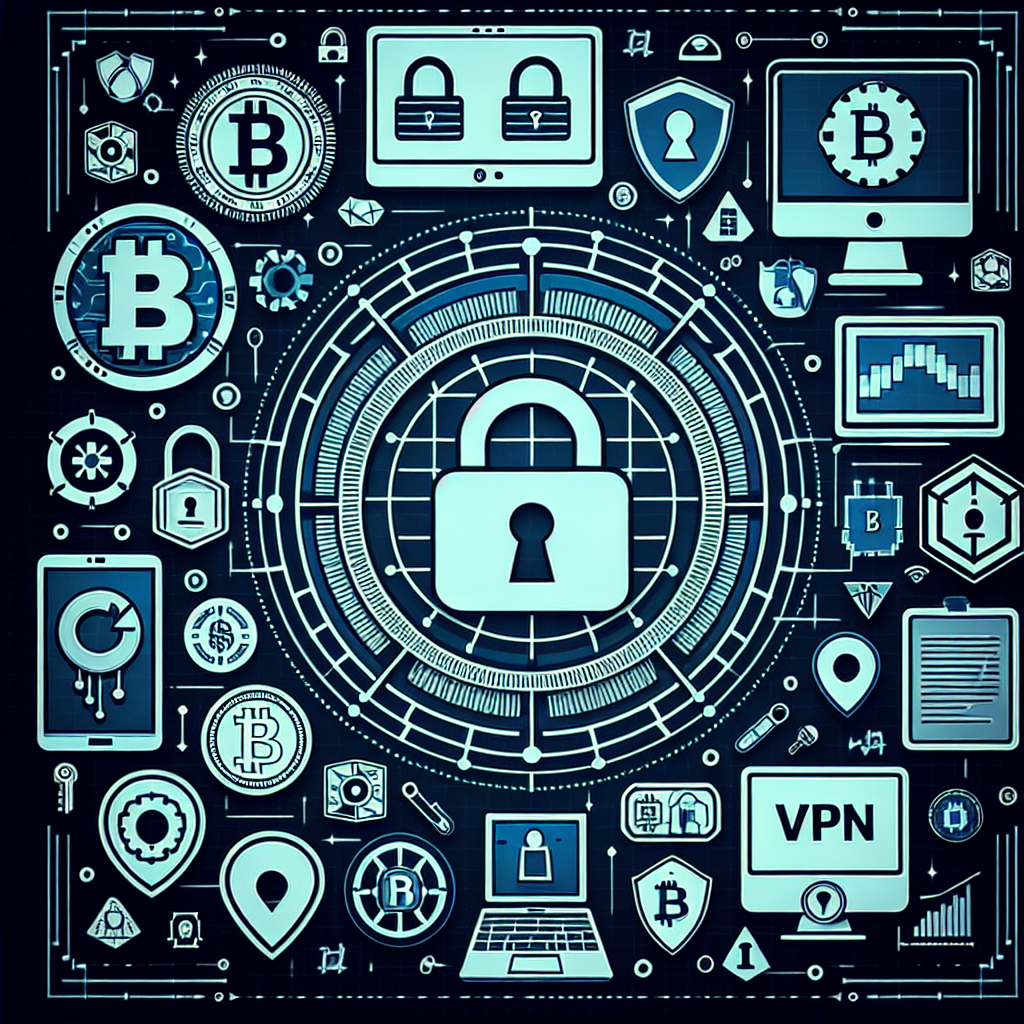Imagine you have just made a hefty investment in cryptocurrency, and now you want to ensure the utmost security for your transactions. That’s where a VPN comes in. In this article, we will explore how you can use a VPN to safeguard your crypto transactions, providing you with peace of mind and the confidence to navigate the digital world of cryptocurrencies securely.

Choosing a Reliable VPN Provider
When it comes to securing your crypto transactions, choosing a reliable VPN provider is crucial. With so many options available, it’s important to research and compare different VPN providers. Look for reputable companies that have been in business for a while and have a solid track record.
Reading reviews and customer testimonials can provide valuable insights into the quality and reliability of a VPN provider. Take the time to sift through both positive and negative reviews to get a comprehensive understanding of the provider’s strengths and weaknesses. Pay attention to any recurring themes or concerns raised by customers.
Consider the provider’s location and privacy policy. Some countries have laws that require VPN providers to retain user data or cooperate with government surveillance programs. Look for providers based in privacy-friendly jurisdictions that have strict no-logs policies. A VPN provider that respects your privacy and prioritizes your security is essential for securing your crypto transactions.
Creating a VPN Account
Once you’ve chosen a VPN provider, it’s time to create a VPN account. Start by selecting a suitable payment plan that fits your needs. Many providers offer several options, ranging from monthly to yearly subscriptions. Take into consideration the level of commitment you’re comfortable with and any potential cost savings of long-term plans.
Next, provide the necessary personal information to create your VPN account. This typically involves providing your email address and creating a unique username. While it’s necessary to provide some personal information for account creation, reputable VPN providers take steps to ensure the privacy and security of your data.
Lastly, choose a strong and unique password for your VPN account. A strong password should include a combination of uppercase and lowercase letters, numbers, and special characters. Avoid using easily guessable passwords or reusing passwords from other accounts. Keeping your VPN account password secure is essential for maintaining the integrity of your crypto transactions.
Installing and Configuring the VPN Software
With your VPN account set up, it’s time to install and configure the VPN software on your device. Start by downloading the VPN software for your specific device. Most VPN providers offer software compatible with a wide range of devices, including Windows, Mac, iOS, and Android.
Once the software is downloaded, install it on your device following the provided instructions. After installation, launch the VPN application and enter your VPN account credentials. This will establish a secure connection between your device and the VPN server, encrypting your internet traffic and ensuring the privacy of your crypto transactions.
Selecting a VPN Server
Choosing the right VPN server is an essential step in securing your crypto transactions. When selecting a server location, consider your needs and priorities. If you want to access geo-restricted content or bypass censorship, choose a server in a location where the content or websites you’re interested in are accessible.
Additionally, consider the server’s latency and load. Latency refers to the delay between your device sending a request and the server responding. A server with low latency will provide a smoother and faster browsing experience. Server load refers to the number of users connected to a particular server at a given time. Connecting to a server with lower load can ensure better performance and stability.
Once you’ve decided on a server, connect to it using the VPN software. This will establish a secure and encrypted connection between your device and the server, protecting your crypto transactions from prying eyes.

Encrypting Your Crypto Wallet
Securing your crypto wallet is paramount to protecting your digital assets. To encrypt your crypto wallet, start by installing a trusted and reputable crypto wallet application. Ensure that the wallet you choose has a strong track record and positive reviews from the crypto community.
When creating a password or passphrase for your wallet, choose a strong and secure combination. Avoid using common phrases or easily guessable passwords. Instead, opt for a combination of random words, numbers, and special characters. The longer and more complex your password is, the more secure your wallet will be.
Consider enabling additional layers of security, such as two-factor authentication (2FA). 2FA adds an extra layer of protection by requiring an additional verification step, usually through a separate device or mobile app, when accessing your wallet. This provides an added level of security against potential unauthorized access.
Initiating Crypto Transactions via VPN
After setting up your VPN and securing your crypto wallet, it’s time to initiate crypto transactions. Start by launching your crypto wallet application. Ensure that your VPN connection is active and secure before proceeding with any transactions.
Connect to the VPN server of your choice to establish a secure connection between your device and the internet. This ensures that your crypto transactions are protected from potential eavesdropping or interception.
Before initiating any transactions, double-check that your VPN connection is stable and secure. Look for indicators within your VPN software that confirm an active and encrypted connection. This will help minimize the risk of unauthorized access or data leaks during your crypto transactions.
Securing Your Connection with VPN Kill Switch
A VPN Kill Switch is an important feature that adds an extra layer of security. It ensures that your connection to the internet is always encrypted and secure, even if the VPN connection drops unexpectedly. Activating the Kill Switch feature prevents accidental exposure of your real IP address and ensures that your crypto transactions remain private.
Enable the VPN Kill Switch feature within your VPN software settings. This will automatically cut off your internet connection if the VPN connection is interrupted. Ensure that the Kill Switch is properly configured to block all internet traffic when the VPN connection is not active. This way, you can rest assured that your crypto transactions are always protected, even in the event of a connection drop.
Protecting Your Crypto Transactions on Public Wi-Fi
Using public Wi-Fi networks to conduct crypto transactions can be risky. These networks are often unsecured, making it easier for hackers to intercept your sensitive data. To protect your crypto transactions on public Wi-Fi, follow these steps:
-
Avoid using unsecured public Wi-Fi networks whenever possible. Instead, opt for secure connections such as your home or personal Wi-Fi network.
-
Connect to the internet through your VPN. This ensures that your data is encrypted and secure, even on untrusted networks. The VPN creates a secure tunnel between your device and the internet, preventing unauthorized access to your crypto transactions.
-
Before initiating any transactions, double-check that your VPN connection is active and properly configured. Look for indicators within your VPN software that confirm a secure connection. This will provide peace of mind and ensure the privacy of your crypto transactions.
Avoiding Phishing Attacks
Phishing attacks are a common threat in the digital landscape, and they can pose a serious risk to your crypto transactions. To avoid falling victim to phishing attempts, follow these best practices:
-
Be cautious of suspicious emails or links. Phishing emails often mimic legitimate communications and attempt to trick you into revealing sensitive information. Avoid clicking on suspicious links or downloading attachments from unknown sources.
-
Double-check website URLs for authenticity. Phishing attacks often involve fake websites designed to look like legitimate platforms. Always verify the URL of the website you’re visiting before entering any sensitive information.
-
Use a reliable VPN to minimize the risk of phishing attacks. A reputable VPN can help protect against phishing attempts by encrypting your internet traffic and hiding your real IP address. This makes it harder for attackers to track your online activities and launch targeted phishing attacks.
Regularly Updating Your VPN Software
Keeping your VPN software up to date is crucial for maintaining optimal security. VPN providers regularly release patches and security updates to address vulnerabilities and improve their software’s performance. By updating your VPN software promptly, you can benefit from enhanced security features and bug fixes.
Check for updates regularly within your VPN software or visit the provider’s website for the latest version. Install updates as soon as they become available to ensure that your VPN software is running on the most secure version.
By following these guidelines and utilizing a reliable and trustworthy VPN, you can secure your crypto transactions and protect your digital assets from potential threats. Remember to research and choose a reputable VPN provider, create a strong VPN account, and configure your VPN software properly. Additionally, take precautions such as encrypting your crypto wallet, utilizing a VPN Kill Switch, and avoiding phishing attacks. With these measures in place, you can conduct your crypto transactions with confidence and peace of mind.

